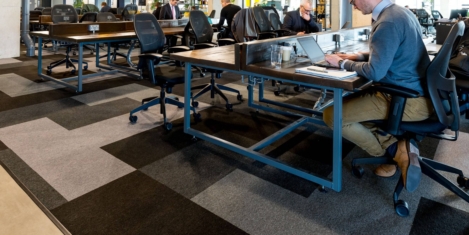September 17, 2018
AI will be commonplace in the working lives of staff very soon
 Experts at Henley Business School have announced that the majority of the graduate workforce in the UK will be working with artificial intelligence on a daily basis by 2030, with technology such as ‘AI assistants’ expected to be commonplace in the next decade. New research released at the Henley annual World of Work 2030 conference, claims that a third (35 percent) of UK workers are excited about the prospect of their own personal AI assistant. With the average worker currently spending 3.5 hours a week on admin tasks, assistants’ could give workers back 12 working days a year (over two working weeks) by taking on these activities and freeing up time for more productive tasks.
Experts at Henley Business School have announced that the majority of the graduate workforce in the UK will be working with artificial intelligence on a daily basis by 2030, with technology such as ‘AI assistants’ expected to be commonplace in the next decade. New research released at the Henley annual World of Work 2030 conference, claims that a third (35 percent) of UK workers are excited about the prospect of their own personal AI assistant. With the average worker currently spending 3.5 hours a week on admin tasks, assistants’ could give workers back 12 working days a year (over two working weeks) by taking on these activities and freeing up time for more productive tasks.







 Employers considering new flexible working options for their employees are concerned about the security and management implications, according to a recent poll, despite the fact that staff now have the legal right to request flexible arrangements. The survey of medium sized businesses, carried out for RSM by YouGov, found that over the next five years, three quarters of respondents were considering introducing flexible terms of employment, allowing workers to work outside 9 to 5 or increasing the use of remote working.
Employers considering new flexible working options for their employees are concerned about the security and management implications, according to a recent poll, despite the fact that staff now have the legal right to request flexible arrangements. The survey of medium sized businesses, carried out for RSM by YouGov, found that over the next five years, three quarters of respondents were considering introducing flexible terms of employment, allowing workers to work outside 9 to 5 or increasing the use of remote working.
 The number of “gig economy” professionals working in organisations is growing and this trend is expected to continue, a survey by Korn Ferry has claimed. More than half (60 percent) of HR professionals say that compared to three years ago, gig workers now make up a larger percentage of their professional workforce, and 42 percent say they plan on hiring more contingent workers in the future. The reasons, according to the survey, include cost savings, access to high-calibre talent and ease of managing gig economy professionals. Despite the fact that many gig professionals work remotely, 67 percent of the HR professionals surveyed say they are confident they know what the gig professionals are doing on a day-to-day basis, and 42 percent say these contingent employees are easier to manage than full-time employees. However, according to Jeanne MacDonald, president of Global Talent Solutions for Korn Ferry’s RPO and Professional Search Business, organisations should proceed cautiously and ensure they continue to cultivate in-house talent.
The number of “gig economy” professionals working in organisations is growing and this trend is expected to continue, a survey by Korn Ferry has claimed. More than half (60 percent) of HR professionals say that compared to three years ago, gig workers now make up a larger percentage of their professional workforce, and 42 percent say they plan on hiring more contingent workers in the future. The reasons, according to the survey, include cost savings, access to high-calibre talent and ease of managing gig economy professionals. Despite the fact that many gig professionals work remotely, 67 percent of the HR professionals surveyed say they are confident they know what the gig professionals are doing on a day-to-day basis, and 42 percent say these contingent employees are easier to manage than full-time employees. However, according to Jeanne MacDonald, president of Global Talent Solutions for Korn Ferry’s RPO and Professional Search Business, organisations should proceed cautiously and ensure they continue to cultivate in-house talent.


 The majority of UK employees check their work emails while on holiday despite the fact that their employers do not want or expect them to keep in touch, new YouGov research has revealed. It seems the majority (60 percent) of those who use email for work check their inboxes while on holiday. One in four (25 percent) check ‘very often’, one in five (19 percent) check ‘sometimes’, and one in six (16 percent) check ‘rarely’. Just four in ten (40 percent) say they never look at their emails. This is despite the fact that eight in ten workers (80 percent) would prefer to ‘completely switch off’ when they’re on holiday, rather than stay on top of what’s going on in the office. The exception is those who check their emails ‘very often’. Half of this group (47 percent) say they’d rather stay on top of what’s going on at work, with the other half (50 percent) happy to stay out of work issues while on vacation. The research suggests however that fewer than one in six think their managers care whether they stay in touch or not.
The majority of UK employees check their work emails while on holiday despite the fact that their employers do not want or expect them to keep in touch, new YouGov research has revealed. It seems the majority (60 percent) of those who use email for work check their inboxes while on holiday. One in four (25 percent) check ‘very often’, one in five (19 percent) check ‘sometimes’, and one in six (16 percent) check ‘rarely’. Just four in ten (40 percent) say they never look at their emails. This is despite the fact that eight in ten workers (80 percent) would prefer to ‘completely switch off’ when they’re on holiday, rather than stay on top of what’s going on in the office. The exception is those who check their emails ‘very often’. Half of this group (47 percent) say they’d rather stay on top of what’s going on at work, with the other half (50 percent) happy to stay out of work issues while on vacation. The research suggests however that fewer than one in six think their managers care whether they stay in touch or not.



















June 21, 2018
The hype surrounding wellbeing concepts can blind us to their true value
by Georgia Elliott-Smith • Comment, Wellbeing
(more…)